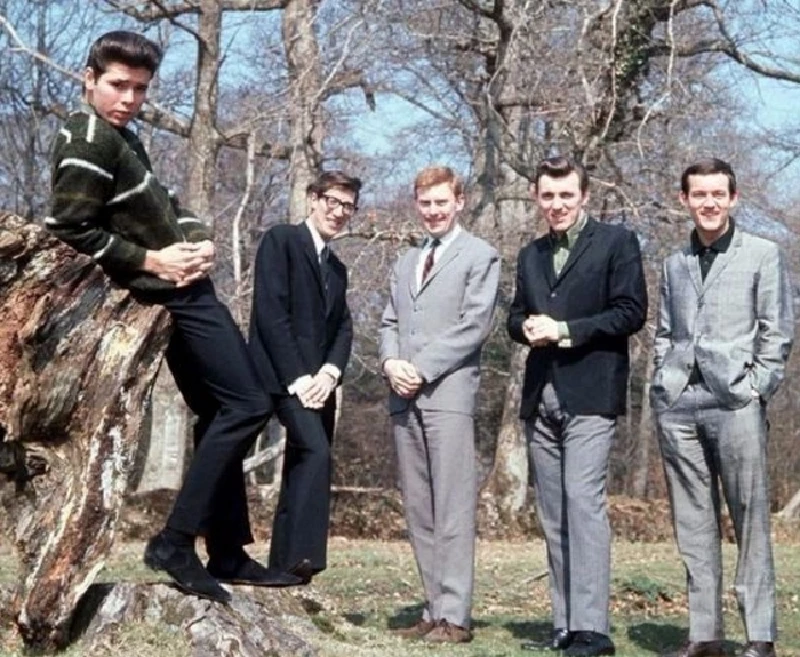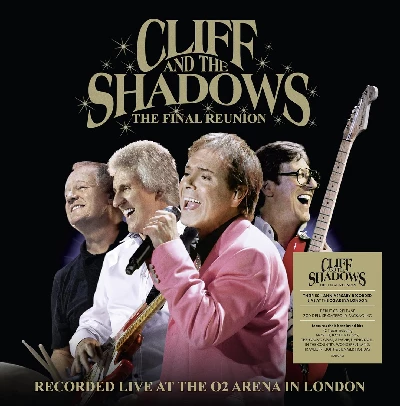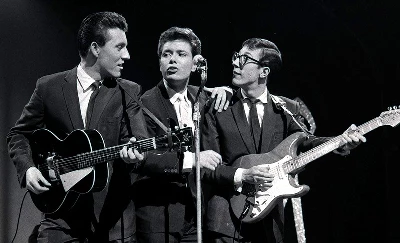Cliff Richard and The Shadows - Facing Up to the Competition
by Bob Nicholson
published: 10 / 4 / 2020

intro
In his second feature for Pennyblackmusic on Cliff Richard and The Shadows, Bob Nicholson reflects on their career post the summer of 1963 and up against Beatlemania.
In a previous Pennyblackmusic article, I argued that Cliff Richard and The Shadows were pre-eminent in the period 1958 to 1963. What happened next? By the summer of 1963, the spotlight had switched to The Beat Boom and The Beatles. Cliff and The Shadows had led British music around the world, opening doors for the invasion by British musicians that would dominate and inspire everywhere. Would they now wither on the vine? Cliff and The Shadows weren’t now facing a single competitor as in the Cliff vs Elvis model. The shock of the new sent A&R managers in search of more groups as the market opened up. Pop/rock began its development into diverse genres. Groups with their roots in blues, R & B and folk, as well as mainstream pop found an audience. A healthy competition developed. The Beatles’ success with their own songs led to original material from their rivals, following Cliff and The Shadows' own hit-writing. The outcome was that Cliff and The Shadows had much more competition for the charts than hitherto - albeit in a larger market. The overall effect on the group was positive. It may even have been a relief. They could not reasonably have expected to continue to dominate. Tastes in music were changing as the Sixties revolution in social attitudes began. The group’s audience did not desert them. The hits continued though they were no longer automatic top ten. Indeed, Cliff’s three hits in the second half of 1963 ('Lucky Lips,' 'All In the Game,' 'Don’t Talk to Him' - this latter written by Cliff and Bruce Welch) reached numbers four, two and two respectively. The Shadows had a number two hit of their own with 'Atlantis' in the same year. However, the new groups were vocal groups which had an impact on The Shadows. The public taste for instrumentals declined but The Shadows’ fan base was reluctant to allow them to change. After 'The Rise and Fall of Flingel Bunt,' they didn’t make the top ten again as The Shadows until 1978. The same conservative attitude was to frustrate their work as harmony group Marvin, Welch and Farrar (MWF) at the start of the seventies. Nevertheless, Cliff and The Shadows adapted and continued to be successful. Cliff had already had a couple of hits without the Shadows’ backing though the B sides featured The Shadows. Yet the future direction was clear. After the 1966 hit, 'In the Country,' which they wrote, The Shadows would not feature on another Cliff Richard A side until 1968’s 'Don’t Forget To Catch Me'. Thereafter, it would be 2010 before another Cliff and The Shadows joint A side, a reworking of 'Singing the Blues' to celebrate their sixty years together. Touring continued until The Shadows took the decision to break up at the end of 1969. The contributions that Hank Marvin, Bruce Welch and Brian Bennett made thereafter were to be very important for Cliff’s career. Hank had already written hits for Cliff, providing him with material that would challenge the stereotype accorded to the singer of 'Congratulations'. 'The Day I Met Marie' (1967) is still a Cliff favourite. 'Throw Down a Line' (1969), written by Hank, was marketed as Cliff and Hank. Hank then wrote two environmental songs which Cliff took into the charts, 'The Joy of Living' (1970) about road building and 'Silvery Rain' (1971) about pesticide use. His work continued to feature on B sides too. Hank’s popularity with the public also led to appearances as comic foil as well as musician on Cliff’s BBC TV series. Brian Bennett was to have an extended working relationship with Cliff. He arranged and conducted orchestras on six Cliff singles from 1969 to 1972. In the same period he was Musical Director of Cliff’s tours in front of the Brian Bennett Orchestra. He also worked with his old colleagues on Marvin, Welch and Farrar’s second album before returning to MD duties on Cliff’s "I’m Nearly Famous Tour" in 1976. Bruce Welch had concentrated on music publishing after The Shadows. Cliff’s early Seventies chart appearances were spasmodic, his highest being the Eurovision entry 'Power to All Our Friends' (1973). He failed to chart in 1975. There was movement, however. An album called '31st February Street' (1974), for which Cliff wrote four of the songs, demonstrated a desire for change and his own renewed interest in his music. Peter Gormley, Cliff’s manager, offered the prospect of producing Cliff’s next album to whichever of The Shadows came up with the best songs. Bruce Welch was ahead of the game and won the contract. His work with Cliff producing the 'I’m Nearly Famous' album (1976) was described by the music press as Cliff’s renaissance. Welch produced two more albums of strong material and Cliff’s biggest worldwide hit 'We Don’t Talk Anymore' which reached the top in 1979. Although their recording careers had diverged since 1966, to their fans Cliff Richard and The Shadows were indivisible. The ongoing relationships made it easy, perhaps inevitable, that they would work together again. The first reunion was the "Thank You Very Much" show at the London Palladium in 1978. Another six years passed to the next, at Wembley and the NEC in Birmingham. Cliff’s "From a Distance – The Event" show at Wembley Stadium (1989), which played to 140,000 people, included The Shadows with whom he played a set. They played a charity gig at Knebworth (1990) before 120,000 people, along with other rock alumni. Twenty years later, to celebrate fifty years, the "Final Reunion Tour" played to around 400,000 people on three continents. The explosion in British pop/rock music from 1963 might have ended their careers. The fact that they survived to become cherished icons was due not only to their talent but to their competitive natures and, as we have seen, their ongoing friendships. On their sadly neglected first album, Marvin, Welch and Farrar wrote a song called 'Mistress Fate and Father Time' – and that title sums up the relationship. 'Mistress Fate' bound them together. And only 'Father Time' will change that.
Play in YouTube:-
profiles |
|
Comment (2024) |

|
| Bob Nicholson enjoys the new release of Cliff Richard and The Shadows' Final Reunion tour from 2009. but asks why it is so belated and asks if recording remotely can ever replace working in a studio together. |
| The Birth of British Pop/Rock (2019) |
most viewed articles
current edition
Carl Ewens - David Bowie 1964 to 1982 On Track: Every Album, Every SongArmory Show - Interview with Richard Jobson
Colin Blunstone - Thalia Hall, Chicago, 16/7/2025
Bathers - Photoscapes 1
Visor Fest - Valencia, Spain, 26/9/2025...27/9/2025
John McKay - Interview
Billie Eilish - O2 Arena, London, 10/7/2025
Robert Forster - Interview
Sir Tim Rice - Interview
Loft - Interview
previous editions
Heavenly - P.U.N.K. Girl EPManic Street Preachers - (Gig of a Lifetime) Millennium Stadium, Cardiff, December 1999
Beautiful South - Ten Songs That Made Me Love...
Pixies - Ten Songs That Made Me Love...
Oasis - Oasis, Earl's Court, London, 1995
Paul Clerehugh - Interview
Prolapse - Interview
Trudie Myerscough-Harris - Interview
Doris Brendel - Interview
Peter Perrett - In Dreams Begin Responsibilities Interview Part One
most viewed reviews
current edition
Phew, Erika Kobayashi,, Dieter Moebius - Radium GirlsAmy Macdonald - Is This What You've Been Waiting For?
Sick Man of Europe - The Sick Man of Europe
Davey Woodward - Mumbo in the Jumbo
Alice Cooper - The Revenge of Alice Cooper
Lucy Spraggan - Other Sides of the Moon
Blueboy - 2
Cynthia Erivo - I Forgive You
Suzanne Vega - Flying With Angels
Bush - I Beat Loneliness
related articles |
|
: Profile (2021 |

|
| Bob Nicholson reflects on the parallels and contrasts between the careers of original rock and rollers Cliff Richard and Elvis Presley. |
Pennyblackmusic Regular Contributors
Adrian Janes
Amanda J. Window
Andrew Twambley
Anthony Dhanendran
Benjamin Howarth
Cila Warncke
Daniel Cressey
Darren Aston
Dastardly
Dave Goodwin
Denzil Watson
Dominic B. Simpson
Eoghan Lyng
Fiona Hutchings
Harry Sherriff
Helen Tipping
Jamie Rowland
John Clarkson
Julie Cruickshank
Kimberly Bright
Lisa Torem
Maarten Schiethart